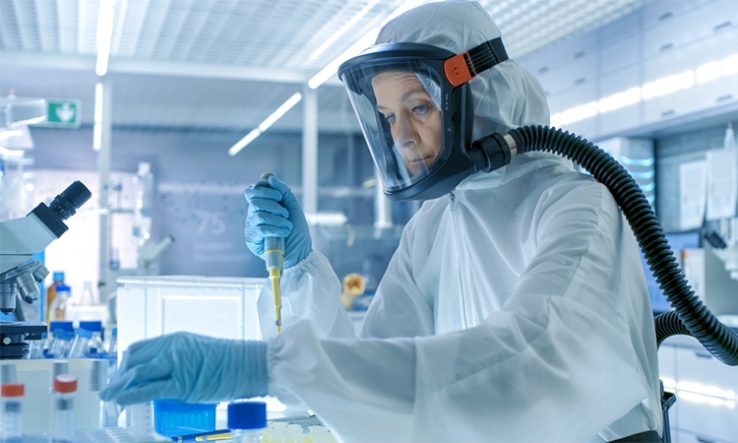
But there are concerns about the long-term implications for research being putting on hold
Clinical academics at UK universities are being redeployed to the NHS to help fight coronavirus, sparking concerns about the long-term implications for their research.
University College London was among the first UK universities to release all clinical staff—including newly qualified medical students—from academic and research responsibilities. The university has also encouraged its scientists to volunteer to work in testing laboratories—while continuing to cover their salary costs.
“What we are facing now is something that is unprecedented in our lifetime, that is a major civil upheaval on the scale of wartime—and it’s absolutely imperative that everybody plays their part in this,” David Lomas, UCL’s vice-provost for health, head of the university’s medical school and a respiratory physician, told Research Professional News.
“Universities are a fabulous resource of very talented, clever people, skills, science, reagents and resources—and it is critical that they are all thrown into the battle and offered up in order to make a difference in this terrible time.”
As the national crisis deepens, Lomas is proud of the leadership UCL has shown.
“I thought it was important that we show leadership and send a signal that my colleagues would hopefully follow,” he said. “And now everyone has.”
Currently, the university is only allowing lab-based research deemed to be “in the national interest”.
“We have asked the deans to prioritise work they think is in the national interest—that is, work that helps in the battle against coronavirus,” he said. This can include everything from Covid-19 clinical trials to behavioural studies on the impact of coronavirus on mental health.
The decision to shut down other research, Lomas explained, is in accordance with the government’s social-distancing guidelines.
“Under the government restrictions, you can’t have more than two people together—so we’ve closed all the labs and sent everyone home, apart from essential security or those working in the national interest.”
Not everyone is thrilled with their labs being shut down, and some fear their research will be delayed and careers affected.
Like many researchers, Lomas is concerned about the continuity of research at the university. However, he says, it’s too early to predict the long-term impact of the current hiatus.
“We’re trying to work out from funding bodies whether they will give extensions to salaries for people who will have to work at home for three months and therefore can’t do their research,” he added.
This, he explained, is a “murky issue”, with some funders more generous than others. Meanwhile, charity funders such as the British Heart Foundation and Cancer Research UK are facing financial issues of their own following the closure of their shops.
Matthias Trost, a biochemist at Newcastle University, has put his research on hold to help the university ramp up local testing facilities in the city.
“I have virtually stopped my own research work,” he told Research Professional News. “I am incredibly thankful to my employer and my group that they support that.”
“I am lucky to be heading a very successful lab and I don’t think that it will very negatively affect the output of my own lab,” Trost added. “I personally thought that helping in this unprecedented crisis is more important than writing another paper—it certainly will be when I will look back at it in 20 years’ time.”
He believes research funders have been “good so far” in their response to the crisis, however, he would like to see them offer at-cost extensions rather than no-cost extensions “as the staff salaries at least should be extended”.
But Bharat Pankhania, a senior clinical lecturer at the University of Exeter and an expert on disease control, is sceptical about the drive to redeploy researchers to the NHS.
“It’s a very fine balance because you may be putting people into a danger zone,” he told Research Professional News. “Calling people back [to work in the NHS] is all well and good, but it’s only well and good if they are useful rather than a hindrance.”
He believes that many of the extra jobs required in the NHS can actually be done by auxiliary staff.
“There should be a proper assessment of whether researchers really need to abandon their cancer, cystic fibrosis or diabetes research to do something that may be doable by someone who could easily be trained,” he said.
Lawrence Young, a professor of molecular oncology and pro-dean of Warwick Medical School, is at the forefront of his university’s response to the crisis.
“The University of Warwick has been really on the ball supporting our collaborative work—including the establishment of a SARS-CoV-2 testing centre at the hospital and the provision of central support via a crisis research response team so that we can use our facilities and expertise in various research activities,” he told Research Professional News.
As a result, many academics at the university, including Young, have been diverted from their usual research activity.
“It’s a massive diversion,” he admitted, “and it’s hard to keep things going. Like many of us, I’m in the middle of writing grants—but all the deadlines are being shifted so we’re all worried about what this means for the continuity of our research. That’s a big worry.”
Like Lomas, he is uncertain what the future holds.
“The issue is, as we look forward and hopefully to the time we start up again, what type of structures do we put in place and how is everything going to start to rev up again? Because the impact is going to be so devastating.”
These questions, and many more, will become increasingly important as the months in lockdown drag on.